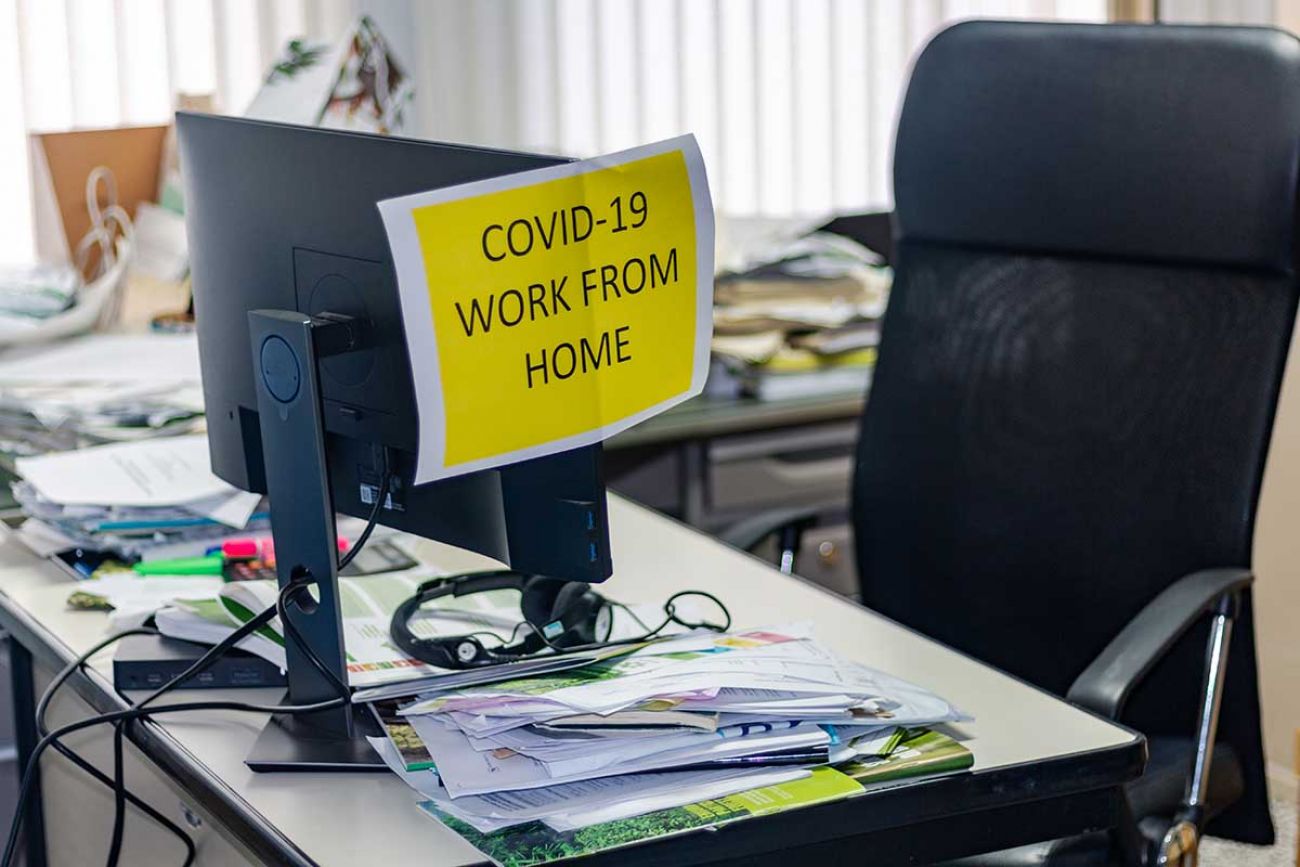Michigan cracks down on workplace COVID rules, urges remote working

A wave of COVID-19 office outbreaks is drawing scrutiny from state workplace health officials who say enforcing work-from-home policies will help prevent virus spread as Michigan is setting new records for cases.
Inspections will take place in offices around the state, according to the Michigan Occupational Safety and Health Administration (MIOSHA).
The heightened attention to office safety comes as the state describes workplaces as “a significant source of spread and outbreaks.”
Employers must prohibit in-person work when an employee’s duties can be done away from the office, said MIOSHA Director Bart Pickelman. They also must create a remote work policy, and – if they have employees working on-site – have a written COVID-19 plan and train staff on protective measures, including social distancing and mask wearing.
“Some workplaces, including offices, seem to be lax on requiring certain protocols,” Pickelman said, adding that “congregating in any setting leads to potential spread.”
As a result, Pickelman said, “remote work for office employees is a crucial mitigation strategy to contain the spread of COVID-19.”
- Nov. 15: Michigan to close high schools, colleges, bars for 3 weeks as COVID spikes
- The latest: Michigan coronavirus unemployment, map, curve, updated COVID-19 news
- Dashboard: Michigan coronavirus testing numbers, trends, COVID-19 data
- Been exposed to COVID-19? A new Michigan app will let you know.
Details on confirmed office outbreaks were not available Thursday from MIOSHA, which said it only receives cumulative data. However, MIOSHA spokesperson Camara Lewis told Bridge Michigan that MIOSHA is getting information on potential workplace problems from public health departments and its own hotline, in addition to business and labor leaders.
“Based on (compliance) allegations, it appears that some workplaces are returning to in-person work prematurely, not understanding or enforcing the full requirements for face coverings, or missing some of the basics to be in compliance with the rules,” Lewis said.
Office settings are only one area where workplaces are seeing new outbreaks, defined as two or more linked cases. As of November 5, the state’s list of new workplace outbreaks included:
- 18 in office settings, up from 14 a week earlier.
- 26 in manufacturing and construction, up from 16 a week earlier.
- 15 in restaurants, affecting employees or customers, unchanged from a week earlier.
- 15 in retail settings, up from five a week earlier.
- 15 in health care, including dentist offices and other non-hospital settings, up from 12 a week earlier.
Outbreaks in long-term care facilities (58 most recently), K-12 schools (44) and colleges (5) also may be affecting employees in those settings.
Meanwhile, ongoing outbreaks in offices total 21.
While office outbreaks are located across the state, nine of the most recent ones are concentrated in Region 6, the West Michigan area that includes Grand Rapids, Holland and Muskegon.
That area has seen COVID-19 cases skyrocket. On Wednesday, Dr. Darryl Elmouchi, president of Spectrum West, part of Spectrum Health, said the system has limited some elective medical procedures, curtailed visitors and begun limiting COVID tests only to those with coronavirus symptoms.
“We are getting to a point where if we don’t have the public helping us you’re going to see a lot more patients in the hospital [and] a lot more patients die and it will not be a pleasant sight,” he said during a press conference.
Eight ongoing outbreaks are concentrated in Region 2’s north area of Macomb, Oakland and St. Clair counties. Wednesday’s new case count of 778 set a record for Oakland County.
Overall, Michigan had 229,285 coronavirus cases as of Wednesday, with 7,766 deaths, or 78 per 100,000 residents.
“Workplace outbreaks are increasing along with the state’s community numbers,” said Sean Egan, director of Michigan’s COVID-19 Workplace Safety.
“Congregation of individuals whether at the workplace or a social gathering can contribute to the spread of COVID-19 in our communities.”
Ingham County Health Director Linda Vail said Thursday that office outbreaks aren’t significant there. However, workplace concerns over the virus continue, with employees getting sick outside of work and then having to stay home.
“Employers all around this county are reporting cases,” Vail said. “Most do not occur in the workplace.”
However, as the reporting continues, the numbers and situations could change.
“Our bottom line,” said Vail, “is there are not many places where there aren’t cases.”
MIOSHA said it will conduct inspections at workplaces with traditional office settings to review how rules are being followed. The goal, MIOSHA said, is compliance.
Under state emergency rules issued October 14 by the Michigan Department of Health and Human Services, businesses that resume in-person work must give workers training on workplace infection-control practices, the proper use of personal protective equipment (PPE) and when they must notify the business of symptoms or a diagnosis of (suspected or confirmed) COVID-19. The business also must tell employees how to report unsafe working conditions.
The state can issue fines of up to $7,000 if inspectors determine there are deficiencies in the employer’s COVID preparedness and response plans.
Workplace breakouts have been part of the Small Business Association of Michigan’s messaging to members for weeks as the coronavirus case count escalation gained steam.
“When you have a large community spread, it’s going to come into your workplace,” said SBAM President Brian Calley during a late October video address to members.
His advice at the time urged employers to consider their daily response to the pandemic and close any gaps that they could find in their enforcement of rules and policies.
“When it arrives at your doorstep, you want to be able to contain it (and) look back and be confident that you did everything you could,” Calley said.
Business Watch
Covering the intersection of business and policy, and informing Michigan employers and workers on the long road back from coronavirus.
- About Business Watch
- Subscribe
- Share tips and questions with Bridge Business Editor Paula Gardner
Thanks to our Business Watch sponsors.
Support Bridge's nonprofit civic journalism. Donate today.
See what new members are saying about why they donated to Bridge Michigan:
- “In order for this information to be accurate and unbiased it must be underwritten by its readers, not by special interests.” - Larry S.
- “Not many other media sources report on the topics Bridge does.” - Susan B.
- “Your journalism is outstanding and rare these days.” - Mark S.
If you want to ensure the future of nonpartisan, nonprofit Michigan journalism, please become a member today. You, too, will be asked why you donated and maybe we'll feature your quote next time!




